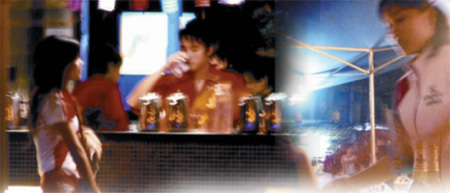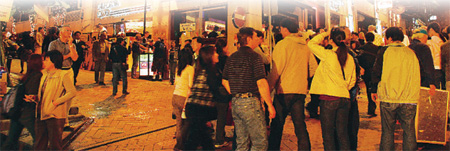Objects of unwelcome desire
Updated: 2011-09-27 07:05
By Ming Yeung(HK Edition)
|
|||||||||


Though Hong Kong has come a long way toward creating legislation aimed at preventing sexual harassment in the workplace or at school, it still has some way to go. But for young women hired to polish the image of their companies, there is no protection from lewd advancement or other forms of sexual harassment from customers. Ming Yeung reports.
Kit Wong, 28, worked as a beer promoter five years ago. She concedes the occupation was "a nightmare" which she would like to forget.
"I felt insulted when customers asked about my body measurements or if I would like to have some fun after work," she recalls, biting her lips.
"Mostly it was whistling and dirty jokes and disgusting sexual comments," Wong adds. "But some of them would even touch my hand or hip!"
More often than not, Wong's boss required her to keep silent out of fear that confronting customers would mean losing them. She quit after a year, and has avoided working in any sexually hostile environment since.
"Men believe that these young women are supposed to maintain a stiff upper lip when being mistreated in the workplace. 'That's how it is!' they say," notes Winnie Ma Wing-yi, vice-chairperson for external affairs from the Association for the Advancement of Feminism (AAF), a nonprofit organization that advocates gender equality through publicity and education.
Kit Wong's case fell outside the scope of the various ordinances designed to protect employees, such as the Sex Discrimination Ordinance (SDO) passed in 1995.
For example, Section 40 of the SDO also stipulates that "it is unlawful for a person to sexually harass a woman in the course of offering to provide, or of providing, goods, facilities or services to her".
"Since there is no 'vice versa' in the provision, service providers are left out from the protection net to lodge complains when being sexually harassed by their customers," stresses Chong Yiu-kwong, solicitor and teaching fellow at the Department of Education Policy and Leadership from the Hong Kong Institute of Education.
A Spokeswoman for the Equal Opportunities Commission (EOC), a statutory body responsible for implementing the SDO, admits that "the SDO currently does not provide protection for providers of goods, services and facilities in respect of sexual harassment by their customers".
The problem in Wong's case is that the SDO is capable of dealing only with complaints within the narrow scope harassment from employers or work associated, at school, in the provision of goods, facilities, services and so on. The SDO also stipulates that it is unlawful to create a sexually hostile or intimidating work environment. The ordinance however makes no mention of discrimination or harassment by customers.
"Nonetheless," the equal opportunities spokeswoman adds, "there is a provision under the SDO (s.23 12(a)(b)) which stipulates that it is unlawful for a person residing in any premises to sexually harass another person - (a) employed by another, at an establishment in Hong Kong and (b) carrying out in those premises work in relation to employment".
"The EOC has handled complaints from workers at elderly homes, hospitals and other establishment for being sexually harassed by service recipients," the spokeswoman says.
She encourages "an employee who has been sexually harassed should report the case to his/her employer so that appropriate action could be taken to address the problem in the work environment".
Hong Kong is a signatory to the Convention on the Elimination of All Forms of Discrimination Against Women. Women's concern groups, however, claim that laws in the workplace have yet to keep pace with the demands faced by Hong Kong women today.
AAF conducted a study in June about disadvantages of young women required to wear uniforms when they deal with customers, such as flight attendants, saleswomen in high fashion and cosmetic, street promoters and cosplay cafe waitresses. They are supposed to look good, or speak well. Their role is to promote a company's image with these attributes. Therefore they are labeled as "aesthetic laborers".
"These female-dominated vocations heavily rely on those who are good looking, young and energetic," Ma says. "This reinforces a narrow understanding of what it is to be female, encouraging fantasies that are focused less on services or skills, and far more on how a person looks."
Flora Li, 28, was a former flight attendant for the city's biggest airline company five years ago. She says, at the training, the trainees were told that they were part of the brand image.
"We were required to put on eye shadows in green or blue to match the company color. Apart from make-up, manicure was a must to all female staff," she says.
She recalls one of the trainees at her class was forced to quit because she refused to put on make-up.
She was told by her friend working for another Asian airline company that the color and brand of the eyeliner she was using was set by the company and could not change.
"Believe it or not, if the girl gets pregnant, she's asked to pack her things and leave," Li adds.
However unreasonable some requirements may seem, Li acknowledges that appearance requirement to the male flight attendant is less strict.
Li says being stared at in a suggestive ways was common while she was working but she was warned she must be tolerant because "customers cannot be offended".
"There is nothing the staff or the company can do if customers do not go too far to harass us," Li says.
The entertainment-cum-dining maid cafes, or "meido kafue", in Ma's view, have pushed the definition to such an extreme that female employees are required to dress up as French maids and other such getup, or to refer to customers as "Master".
"The fad of cosplay cafes is a sign of dclass that aims to fulfill the fantasy of a certain group of customers in which female bodies are consumed," says Ma.
In addition to the lack of legal protection, the high turnover in the service industry also prevents many victims from reporting their cases.
"Many of them don't see a bright future in the industry and won't stay long, so they prefer to keep their mouths shut. When the whole society turns a blind eye to this phenomenon, more and more women will become victims," Ma comments.
Feminist groups have also criticized the government for delaying the extension of the scope of protection against sexual harassment by customers and in other contexts.
"In 1999, the EOC submitted a set of proposals to amend the SDO and the DDO (Disability Discrimination Ordinance). One of proposed amendments for SDO was to extend coverage in respect of sexual harassment by customers against service providers (s.40 (1) SDO). In 2000, the government agreed to extend protection in this respect. Despite the government's agreement in principle on the proposals, they have not yet been taken forward," the EOC spokeswoman says.
Up to now, 11 years after the government's agreeing to the proposals, the amendment to the SDO still has not been proclaimed.
"The EOC Chairperson wrote a letter to the Secretary for Constitutional and Mainland Affairs in August 2011 to urge the government to take forward the proposals as soon as practicable," she adds.
In the meantime, the spokesman for the Constitutional and Mainland Affairs Bureau says "the EOC submitted a set of revised proposals for statutory amendments in August 2011. The administration is examining these proposals, taking into consideration recent developments. After we have completed our examination, we will consult the Legislative Council Panel on Constitutional Affairs and relevant parties."

(HK Edition 09/27/2011 page4)